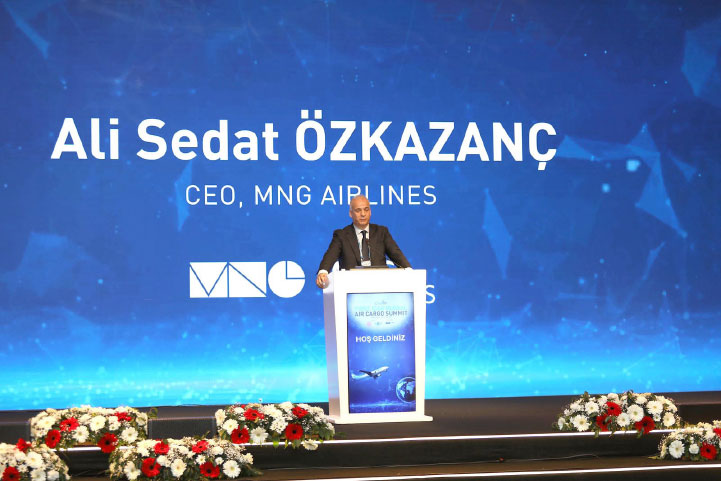


The International Civil Aviation Organization (ICAO) successfully concluded its first-ever Global Air Cargo Summit last week in Antalya, Türkiye, where representatives from nearly 80 States came together to foster greater efficiency, innovation, and environmental responsibility in air cargo operations.
The three-day summit, hosted by the Turkish Directorate General of Civil Aviation and sponsored by MNG Airlines, attracted over 600 high-level participants from across the global air cargo value chain, including regulators, airlines, airports, freight forwarders, customs authorities, and international organizations. Aviation Turkey served as the media partner of the Summit, providing in-depth coverage and sectoral insights throughout the event.
The opening session featured key addresses from industry leaders: Ali Sedat Ozkazanc CEO, MNG Airlines; Enes Çakmak, Director General, Directorate General of Civil Aviation – Türkiye
Ian Saunders Secretary General, World Customs Organization; Mohamed Rahma Director, Air Transport Bureau, ICAO; Prof.Dr.Kemal Yüksek, Director General, Directorate black General of Civil Aviation, Türkiye
In his keynote speech, ICAO Secretary General Juan Carlos Salazar shared a compelling personal story that connected him to the air cargo world: “I myself started my career in aviation working for an old cargo airline. That experience gave me a deep understanding of what makes air cargo so unique and of the many different ways it benefits States and societies.”
He highlighted that although air cargo constitutes only 0.5% of international trade by volume, it accounts for over one-third of the total value. “It is the backbone of our global economy,” Salazar remarked. “Every mobile phone, vaccine, semiconductor, or e-commerce package we receive is part of a global chain made possible by air cargo.”
He emphasized the growing strategic importance of air cargo in global trade:
“While air cargo represents only half a percent of international trade in volume, it accounts for over a third of the total value. Speed and reliability are the defining factors. We expect this trend to continue, with ICAO forecasting annual growth of 3.2% in air freight volumes through 2050. Meeting this demand requires modernizing regulatory frameworks and removing barriers that hinder cargo operators and global commerce.”
He also drew attention to the growing risks associated with dangerous goods, particularly lithium batteries, and emphasized the need to foster a strong safety culture across the entire supply chain. “Today, dangerous goods can make up to 80% of cargo on some flights,” he stated, underlining that lithium battery-related fires have already caused fatal freighter incidents.
Technology, innovation, and sustainability formed another central theme. “We are not only working to safeguard air cargo, but to transform it,” Salazar emphasized. ICAO’s efforts in promoting electronic documentation, automation, artificial intelligence, and sustainable aviation fuels (SAF) were showcased through programs such as ACSAF and the Global Framework for Aviation Cleaner Energy. These initiatives aim to help the sector meet its net-zero emissions target by 2050.
The Summit also served as a preparatory ground for future regulatory discussions to be addressed at the upcoming ICAO Assembly. “The caliber of our speakers will lead us to far-reaching conclusions and recommendations. This will help shape the future of air cargo,” Salazar concluded.
World Customs Organization Secretary General Ian Saunders echoed these sentiments, highlighting the need for strong partnerships between aviation and customs stakeholders:
“The security, resilience, and efficiency of air cargo are essential to the global economy, and this importance will only grow as trade volumes and systemic risks increase.”
Throughout the summit, participants engaged in focused discussions on a wide range of critical topics, including:
• Liberalization of market access
• E-commerce integration and infrastructure development
• Cargo release and clearance procedures
• Automation and the role of unmanned aircraft systems
• Dangerous goods handling and overall safety
• Environmental sustainability strategies
Key themes emerging from the summit included:
• The pivotal role of digitalization in enhancing supply chain transparency, efficiency, and security
• The need for harmonized regulatory frameworks across borders to support trade facilitation and risk management
• The urgency of implementing sustainable practices to reduce emissions amid rising demand
• The development of a robust safety culture, particularly regarding the transport of dangerous goods
• The transformative potential of advanced air mobility technologies for cargo delivery
The pandemic-era reliance on air cargo for essential goods — including medical supplies and vaccines — also served as a powerful reminder of the sector’s resilience and strategic value.
A highlight of the event was a landmark commitment from MNG Airlines, the summit’s key sponsor.
During a special handover ceremony, CEO Ali Sedat Özkazanç presented a formal pledge to ICAO, committing significant financial support toward aviation initiatives aligned with ICAO’s Strategic Objectives and its No Country Left Behind initiative.
“This is more than a donation — it’s a reflection of our lasting commitment to ICAO’s vision and to building a more sustainable and inclusive future for global aviation,” stated Özkazanç.
In her closing remarks, ICAO Air Navigation Bureau Director Michele Merkle reinforced the broader implications of air cargo beyond logistics:
“The pandemic taught us that air cargo is a lifeline in global crises — but even beyond emergencies, it is a vital enabler of economic growth, trade, and societal advancement.”
The outcomes of the Global Air Cargo Summit will help shape discussions during the upcoming ICAO Assembly in Montréal this autumn, where ICAO’s 193 Member States will convene to define the future direction of civil aviation worldwide